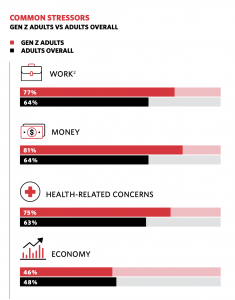As Aleyna approached the end of her degree program at the University of Maryland, she was eager to find a job where she could apply her knowledge and hone her skills in marketing. Always a high-achiever, she wanted to find a company that was growing and that developed products or services she could get excited about. She wanted to get to work and to make an immediate impact.
She found a promising opportunity—a health-care startup that needed help in the marketing department. So she applied.
After an encouraging round of interviews, Aleyna felt confident she would receive an offer.
But when a week passed without word, she began to worry. Two weeks went by. Then three. By the fourth, anxiety was giving birth to other thoughts and feelings—confusion, anger, fear, and shame.
“I wondered, What is taking so long?” Aleyna said. “That hurt me and made me insecure.”
Finally, after a month of waiting, Aleyna was offered a job. But even that didn’t resolve all of her anxieties. She had been offered a different job than the marketing position she’d applied for, and later learned that someone else had been hired in the marketing department.
“I was afraid that some of my job opportunities were being taken away,” she said.
As Aleyna began her first full-time, post-college job, these specific worries subsided. But others soon crowded in. The consistent, concrete performance feedback loops she’d experienced in college weren’t always replicated in the workplace.
“I felt like I wasn’t good at [my job], like there was always someone better than me,” she said. “For a while, I wasn’t getting affirmation, so I thought I wasn’t doing good work. Do I need the affirmation? I guess I need some guidance to know what I am good at and bad at.”
Without consistent feedback, Aleyna was often stressed at work.

Stress in America: Generation Z. Stress in AmericaTM Survey.
Research by the American Psychological Association suggests that the stress and anxiety Aleyna experienced in her job is now normal among young adults. More than half (54 percent) of Gen Z workers (those younger than 23) said they felt anxious or nervous due to stress in the previous month, compared with the national average of 34 percent.
These numbers are in line with larger trends of stress among Gen Z and Millennials, who report the highest level of anxiety among all generations. When Gen Z young adults were asked to rate what they were stressed about, 77 percent said work, and 81 percent mentioned money.
Much has been written on why young adults today are so anxious. From declining religious practices to the role of social media to sky-high school debt, young adults face myriad challenges to mental health.
These facts are changing the world of work, and employers are taking notice. To give young adults tools to manage stress, employers are offering mindfulness training, meditation spaces, promoting social connections. Managers are being encouraged to create safe work environments where people can admit mistakes (actually, the preferred language is “accidents,” which increases the likelihood that a person might feel safe enough to fess up).
If companies are seeking to do all they can to help young adults manage stress, what is the role of pastors and churches? How can we best shepherd our youngest working generation?
Tools
Churches can play a unique role in providing a God-centered, practice-based perspective on dealing with anxiety.
This is not to diminish the important role that professional counselors, modern medicine, and relationships play. But the church has another layer of understanding to contribute—akin to what Clifford Geertz, and later Kevin Vanhoozer, have called a “thick description.”
Anxiety can often be the physical manifestation of certain narratives that get lodged in our minds (acknowledging all the individual differences of neurobiology, brain chemistry, and the role of trauma).
Churches can play a unique role in providing a God-centered, practice-based perspective on dealing with anxiety.
For instance, we might have an inner murmur in which we tell ourselves, I’m not good enough, or I don’t really belong here. Behind these thoughts is a narrative about worth. Am I worthy of respect and love?
Or we might become paralyzed at work as we tell ourselves, I can’t make a mistake, or If I show weakness, others will learn that I am a fraud. Behind these thoughts is a narrative about control. Can I fully control my circumstances?
Or if work isn’t going well, we may think, Things will never get better, or I’m doomed to fail, or I will never get ahead. Behind these thoughts is a narrative about hope. Do I have hope for my future?
These questions—embedded in larger frameworks of worth, control, and hope—are powerful drivers of our emotions. They’re also themes the Bible often addresses.
Finding Worth, Control, and Hope
Counselors sometimes speak about the power of self-talk, that inner monologue we use to narrate our life experiences. Self-talk can be almost oppressively negative (What were you thinking, you idiot?) or, on the opposite side, mostly cheerful and encouraging (I am fully capable of getting this done). It often exists at an almost subconscious level—we don’t always or even usually notice the self-talk in our heads. Nevertheless, it can become more regulated and intentional through disciplined practice.
Pastors and churches have an important role to play in this area. Self-talk is akin to the biblical idea of meditation—the discipline of the mind to chew on and rehearse true statements about God, ourselves, and others.
Throughout history, the Christian church has acknowledged that the gospel’s truths must be driven down into our hearts through constant practice and meditation. Or, if you like, through self-talk.
Throughout history, the Christian church has acknowledged that the gospel’s truths must be driven down into our hearts through constant practice and meditation.
Any preacher knows that the gospel speaks deeply and profoundly into matters of worth, identity, and hope. Jonathan Edwards, in his brilliant sermon on Romans 8:28, grounded the gospel in these three themes. The familiar Scripture reads, “And we know that in all things God works for the good of those who love him, who have been called according to his purpose.”
Edwards told his listeners there were three reasons why they could be happy and free from worry.
First, all the bad things in our lives will eventually work for our good, like a “sharp medicine.” This truth is fundamentally about control. We can be set free from the need to control all outcomes, for God is already directing every circumstance to turn out, in the end, for our good. God is at work in and through us, even amid the deepest trials and disappointments in our workplaces.
Second, we cannot lose the good standing we’ve been given in Christ. This truth is about worth. In lavish mercy and love, God calls us beloved children. The One whose opinion matters above all others says we are dear to him. There are times when, at work, we are tempted to think we are worthless. But God, through Christ, doesn’t waver in his tender love toward us.
Third, eternal gladness and joy is prepared for all who are in Christ. This truth is about hope. “The good man,” Edwards said, “has a well-grounded hope that what he loves now above all things he shall then enjoy to the full of his desires, and whatsoever little beginnings of pleasure he feel now, he is assured, shall bestow the highest perfection without the least mixture of the contrary.”
In the low points and sometimes severe challenges of work, we are able to see, however dimly, a bright, infinitely joy-filled future.
The local church is primed to develop communities of people who are inhabiting these practices, and perhaps others, that combat fear and anxiety.
These three themes of the gospel must be driven down into our hearts through practice—through Bible memorization, through songs, through sermons, through conversations, through books and articles. The local church is primed to develop communities of people who are inhabiting these practices, and perhaps others, that combat fear and anxiety.
When we know and believe these truths, we won’t be anxious, but rather, as Edwards said, “happy in whatsoever condition [we are] in.”
Involved in Women’s Ministry? Add This to Your Discipleship Tool Kit.
 We need one another. Yet we don’t always know how to develop deep relationships to help us grow in the Christian life. Younger believers benefit from the guidance and wisdom of more mature saints as their faith deepens. But too often, potential mentors lack clarity and training on how to engage in discipling those they can influence.
We need one another. Yet we don’t always know how to develop deep relationships to help us grow in the Christian life. Younger believers benefit from the guidance and wisdom of more mature saints as their faith deepens. But too often, potential mentors lack clarity and training on how to engage in discipling those they can influence.
Whether you’re longing to find a spiritual mentor or hoping to serve as a guide for someone else, we have a FREE resource to encourage and equip you. In Growing Together: Taking Mentoring Beyond Small Talk and Prayer Requests, Melissa Kruger, TGC’s vice president of discipleship programming, offers encouraging lessons to guide conversations that promote spiritual growth in both the mentee and mentor.

































